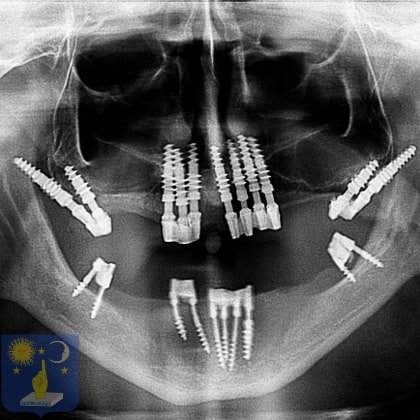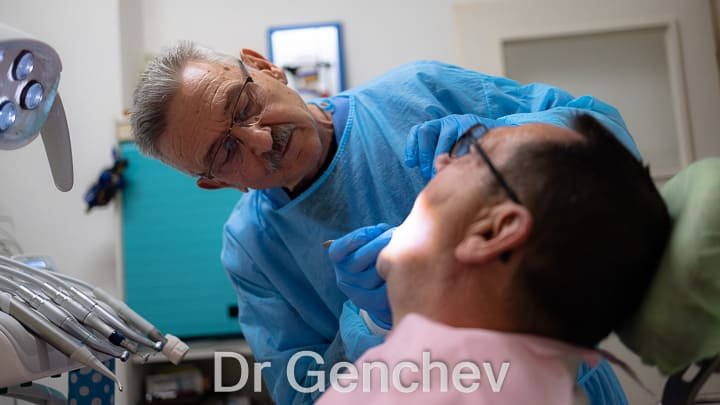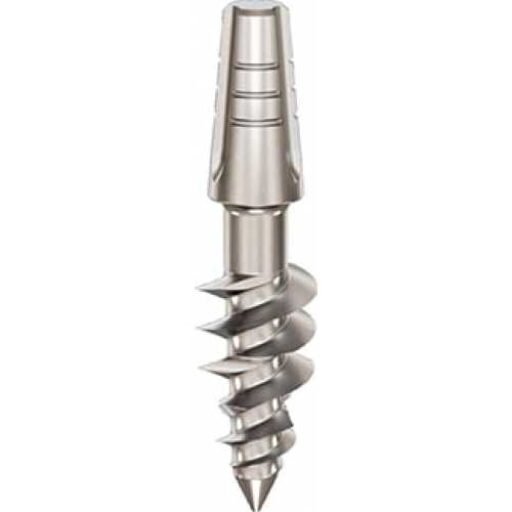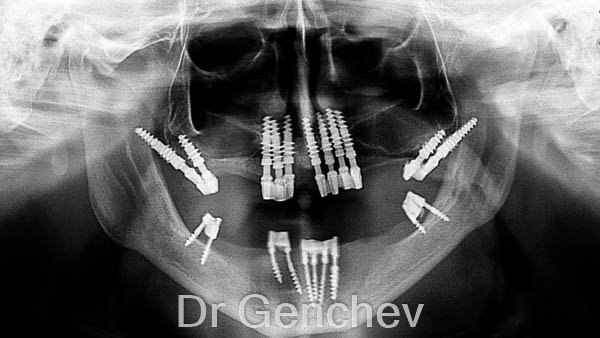Dental treatments with basal implants
Basal dental implants are the best solution for the treatment of missing teeth, edentulism, with severe bone loss, bone atrophy, as well as the treatment of gum disease, periodontitis, and the effects of bruxism, teeth grinding.
And for smokers and patients who suffer from diabetes basal implants are the best solution to replace missing teeth.

What are basal dental implants?
How are basal implants used by dentists?
The basal dental implant is a type of dental implant that has been specially designed for the full dental restoration of patients who are edentulous, have missing teeth, with significant bone loss, also called bone atrophy.
Basal implants are longer compared to traditional conventional implants. They are fixed into the hard cortical bone that is not subject to resorption with tooth loss. It avoids additional procedures such as sinus lift and bone grafting.
Basal implantology is defined by fixing one-piece dental implants in the cortical bone. It is in contrast to conventional implantology that uses 3 piece dental implants that are placed into the spongy cancellous bone. Cortical bone is deeper and harder than spongy cancellous bone.
Cortical bone does not recede with tooth loss. Cortical bone gives the basal dental implant greater stability. Basal implants are a better solution for patients who have missing teeth because the cortical bone does not recede. On the contrary, spongy cancellous bone resorbs completely after the loss of teeth within 18 months
Before and After Basal Dental Implants
Basal dental implants are the best solution for the full mouth dental restoration of patients with missing teeth and severe bone loss.
The advantages of basal dental implants
What are the advantages of basal implants for full mouth dental restoration?
Basal implants are longer compared to traditional conventional implants. They are fixed into the hard cortical bone that is not subject to resorption with tooth loss. It avoids additional procedures such as sinus lift and bone grafting.
Success rate for basal dental implants
What is the success rate for basal implantations?
Basal dental implants have a higher success rate than traditional conventional implants. Basal implants are fixed into the cortical bone that is hard and not prone to resorbtion. They are more reliable than conventional implants that are placed in the soft gums that can recede. Basal dental implants are unlikely to be rejected like traditional implants.

NO Bone Graft
No bone graft needed because it often fails for edentulous patients with severe bone loss.

NO Zygomatic implants
No need for zygomatic implants that increase the risk of complications.

NO Sinus Lift
Sinus lift can cause chronic sinusitis. Basal implants avoid the need for lifting the sinuses.
The disadvantages of traditional dental implants
What are the problems associated with conventional dental implants?
Traditional dental implants are short and are placed in the spongy bone that disappears after tooth loss. This is a problem for treating missing teeth with bone atrophy or cases of severe periodontal disease. To compensate for this shortcoming conventional implant dentists recommend bone grafting and sinus lift. Because basal implants are longer and are fixed into the cortical bone they avoid this problem and the need for these additional procedures.
The risks of All on 4 and All on 6
What are the issues linked to the All on 4 system for dental restoration?
All on 4 is not a good solution for patients who suffer from edentulism, missing teeth, with severe bone loss. The All on 4 dental restoration system does not restore the complete functionality of the jaws. It does not provide a replacement for the molars at the back of the jaws to enable normal mastication.
And whilst zygomatic implants are classified as basal implants because they are fixed into the cortical zygoma bone, they are not used by basal implant dentists. Basal implantologists prefer to avoid passing through the sinuses and use as an alternative pterygoid dental implants that are positioned behind the sinuses.
Basal implantology offers a complete solution for dental restoration of oth jaws. Pterygoid dental implants are fixed behind the sinuses to recreate the natural functionality of the mouth and normal mastication with the molar teeth.
The alternatives to dental implants
What are the alternatives to dental implants for the treatment of missing teeth, bone loss and gum disease?
There are no satisfactory long-term solutions that are better than basal implants for the full dental restoration of both jaws. The only alternative is to fit removable bridges that are maintained with dental glue.
Comparison Basal Vs. Traditional Dental Implants
Traditional conventional implants are too short to be used on edentulous patients with significant bone loss. To use a conventional dental implant with severe bone loss requires a bone graft or a bone compensation or a sinus lift.
These additional procedures cost time and money. In conventional dental implantology, they are necessary to create sufficient bone material to place the conventional implant. Even though, most of the time, the bone graft or bio-bone is reabsorbed by the body within a few months and disappears. It often doesn’t harden and remains as a powder or jelly in the bone. This is not a good basis for screwing in the conventional dental implant.
Basal Implants

Long implants

In hard cortical bone

10+8 dental implants
Traditional Implants

Short implants

In soft spongious bone

Only 4+4 implants
Price for full mouth dental restoration with basal dental implants
What is the cost for a dental treatment with basal implants?
The cost of a full mouth dental restoration with basal dental implant depends on the dentist and the treatment plan. For a quote, please contact one of our dentists.

Dr Georgy Genchev is one of the best implant dentists specializing in the full dental restoration edentulous patients with severe bone loss and periodontal disease with basal implants.
Dr Genchev practices in Bulgaria. He has many patients from the United Kingdom, Ireland, the USA, Canada and Australia.
This page is sponsored by Dr Genchev.
Ask us how to sponsor content on the site of The Basal Dental Implant Association
The History of Basal Dental Implants
In 1972 Dr. Jean-Marc Julliet from France developed the first theory of a one-piece dental implant that could be fixed in the cortical bone.
Later in 1970’s, Dino Garbaccio from Italy, first introduced the concept of screw bicorticalism and its practical application in dental implantology. It was the effective start of basal implantology.
By the 1980’s Stefano Tramonte from Italy further developed the technology for basal implantation with immediate-load basal dental implants. To this day Silvano Tramonte, the son of Stefano Tramonte, continues to teach basal implantology to dentists in Italy.
In the mid 1980’s Dr. Gerard Scortecci from Nice in France developed the technology of disk implants that are inserted laterally in the jawbone.
By the 1990’s Dr. Prem Nanda trained the first basal implant dentists in India. And Dr Verendra Kumar developed a new line of basal dental implants called Monoimplant that is used worldwide.
Around 2005 Dr Stefan Ihde launched a new brand of basal dental implants Biomed. He has since trained many dentists in basal implantology in Eastern Europe especially in Bulgaria, Romania and Serbia.
By 2015 new brands of basal dental implants have emerged and improved the technology of cortical basal implants such as BasalFix and ROOTT. Each brand of immediate loading basal dental implants offers similar sizes with some small variants. Many implantologists prefer to use a wider range of basal implants and different brands depending on the needs of each patient.
Dentist? Do you practice basal implantology?
Become a member of the Association of Basal Implant Dentists
We will make you a free profile and include you in our international directory of basal implant dentists.

International Brands for Basal Dental Implants
All basal dental implants are made from titanium. It is the metal that is best accepted by the human body. It is the same metal used for artificial hip and knee joints. There are few, if any, allergic reactions to titanium. The quality for these different brands of basal implants is on par. Many sizes and designs are standard across brands. Some brands offer improved designs and greater variety of sizes that are preferred by some implant dentists. Many dentists use a broad range of basal dental implants from different brands to meet the needs of their patients.
Monoimplant
Tramonte
Garbaccio
Ihde Dental Biomed
NSI
BasalFix
ROOTT
Are you a producer of basal dental implants?
List your implants on the site of the Association of Basal Implant Dentists
You can present your implants to our international directory of basal implant dentists.
Results for full dental restoration with basal implants

Testimonials of dental patients
Video testimonials of patients who have done a full mouth dental restoration with a basal implants.

Photo of basal implantations
Results for dental implantation basal implants to treat edentulism, periodontal disease and bruxism.
Basal implants before after
See photos before and after a full dental restoration with basal implants.
Reviews for Dental Implantations with Basal Implants
chewing and smiling again
It’s been 6 months now since I had my 2 jaws restored and I’m satisfied with the result – no regrets, I can chew and smile again. Dr Genchev has mastered his art perfectly. Even though I was stressed during the local anaesthetic procedure, which lasted just over 2 hours, he did a tremendous job in such a short time, with great confidence. I was worried about when the anaesthetic would wear off, but for no reason, in fact, by the evening it was fine. Most of the work took 2 hours.
There are still 2 appointments to try on the prostheses
and adjustments to finalize the operation. Mr. and Mrs. Genchev and Julien made a very nice team.
Many thanks
Pascal
Translated from Dr Genchev’s French website https://www.dr-genchev.fr/implant-basal/avis/
great professional
Very good welcome by Julien super friendly and doctor genchev and his wife of very great professional listening to patient in Plovdiv is a beautiful city we will return it has become like friends super.
Jean-Paul
Translated from Dr Genchev’s French website https://www.dr-genchev.fr/implant-basal/avis/
5 stars for the result
I have no problem giving the result 5 stars, but I’ll explain my point of view anyway 😅… First of all, what you need to know (and what I didn’t realize) is that, unlike treatments evaluated in France and Switzerland (respectively envron 3x and 4x more expensive 😳), here we don’t fit crowns tooth by tooth, but a “mega” bridge for the top and another for the bottom. This explains the price and the incredibly short treatment time. Advantages:
– Everything in one go
– As everything is connected, nothing moves (when a tooth moves, there’s a risk of infection (this was my case 3 weeks before…)).
– The prosthetist has a simpler job of “making” everything fit together (I think).
– The cost
– Treatment time
– No tooth-by-tooth adjustment required Disadvantages :
– may look less natural than when done tooth by tooth
– Impression of having a pair of flip-flops instead of teeth 😅
– If there’s a problem on an implant or root, you’re going to have to cut off a piece of it, which may not be as easy as blowing up a single crown (but I don’t know about that, of course).
– No tooth-by-tooth adjustment (also seen as an advantage in terms of treatment complexity). In my opinion, it’s all or nothing 😅. Either it “fits” or it’s the me… But then again, these guys aren’t exactly new at this either… Duration of procedures :
Grinding of remaining teeth and placement of implant(s) and extraction(s) of “rotten” material: about 3 hours 😳 (observed on 2 very different cases).
Including taking impressions for the prostheses. This is nothing like what would happen in France or Switzerland… Prosthesis fitting: 1h Pain :
Personally to die for… 😩, but of course everyone is different…
I think the more you’ve suffered with your teeth (in my case since I was 8), the more sensitive your nervous system becomes…
But the 5 punctures in the palate and the 5 in the lower gums are still a moment that’s hard to appreciate… So I really had a hard time of it for 36 hours after the “trimming” and 12 hours after the prostheses were fitted.
Which seems logical to me, given that they don’t go to extremes and everything is done in one go… For me, it’s a bit like saying: level 2 pain for 20 operations or level (I’ll let you put a number on it) for just one… The method is “violent”, but in the end I think I suffered less than for a treatment spread out over a year or more… It’s just that there’s no such thing as “pain-free” as soon as the body is attacked… Technology and “decorum” : Bulgaria doesn’t have the per capita income level of France or Switzerland, so obviously the high-tech cabinet part with mannequins wiping your mouth is forgotten 😅 I remain convinced that people without the latest technology are often more pragmatic and skilful than those who have it… Plus the Soviets having occupied the country for a few years 😒, there’s a way of doing things that must come from that era (personal opinion)… Dr Genchev: A really gifted one in analyzing an X-ray for example (everything seen, predicted, defined on a single X-ray) and certainly a “King” in placing implants and prostheses 🤩. Conclusion:
If the aforementioned “disadvantages” are not prohibitive for you, then I totally recommend. There’s still the pain 😩 and the “clapper function”😅 In any case, the result is there 🤩🤩 and so is the price (I couldn’t afford to pay more anyway, given that nothing is reimbursed…) And on top of that, the “super bonus” is having Julien who is French-speaking and who does everything to guide, explain and reassure you 😃😃!
A really “cool” “guy” with 2 adorable children, which means that being able to smile at them again with full teeth is a real joy 😍 It’s up to you to see… 😃😃 PS: Povlivd, lost in the “pampa” 😅is really a superb historic town to boot 🤩😍Display less
Yves
Translated from Dr Genchev’s French website https://www.dr-genchev.fr/implant-basal/avis/







